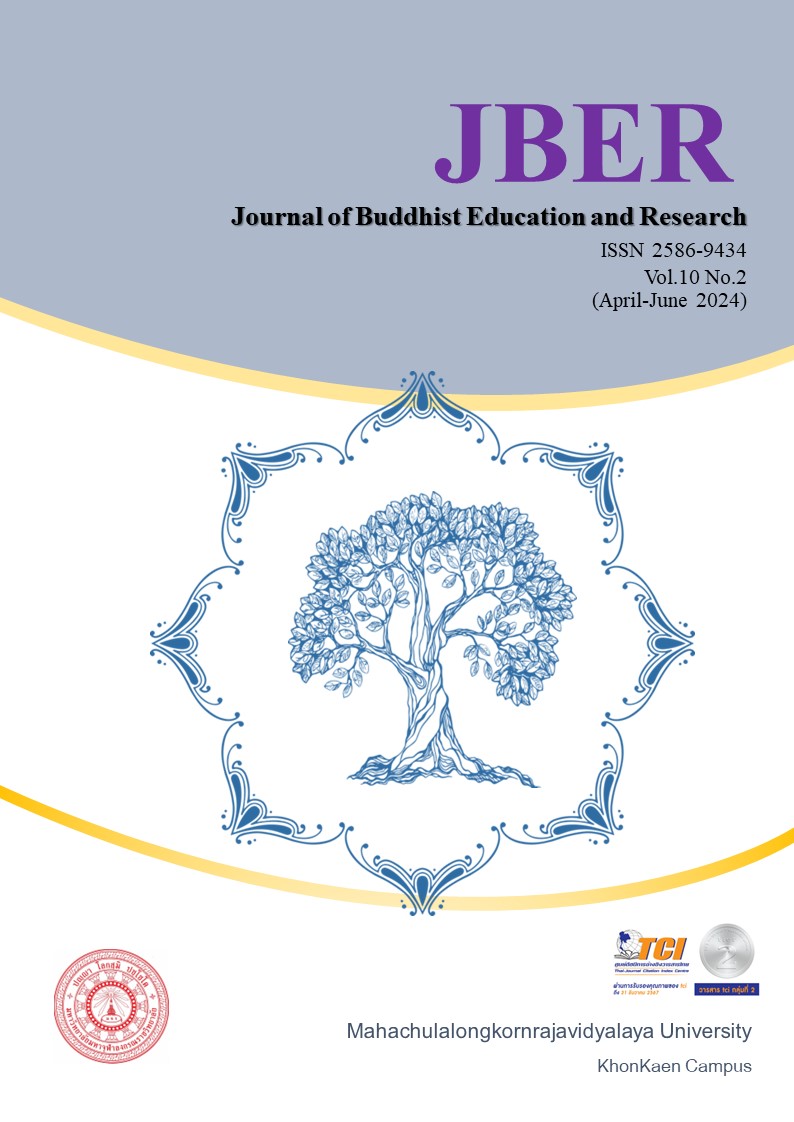DEVELOPMENT OF GRADE 4 STUDENTS' MATHEMATICAL IDENTITIES THROUGH 5 PRACTICES MATHEMATICS DISCUSSION LEARNING ACTIVITIES IN DECIMALS
Keywords:
5 practices mathematics discussion learning, Mathematical Identities, DecimalsAbstract
This independent study aimed to investigate the implementation of mathematical discussion based on the 5 practice model to enhance mathematical identity among primary 4 students. Additionally, the study examined the students' mathematical identity following the intervention. The research employed a classroom action research approach, involving 20 students from an opportunity expansion school in Uthai Thani Province, Thailand. Data collection instruments included a reflection form on lesson management, an individual observation form of participation in activities, and a mathematical identity assessment. Qualitative data analysis was conducted using content analysis, while quantitative data was analyzed using descriptive statistics. Key Findings
Effective teaching strategies in a classroom with students with reading and writing difficulties include: Utilize challenging and experience-based mathematical activities; Provide opportunities for students to express their ideas in various forms; Employ random selection for presentation order to foster a sense of shared learning; Stimulate student engagement and expression of ideas through open-ended questions; and Connect student ideas to create knowledge applicable to problem-solving. Positive Impact found on Mathematical Identity: 70% of students demonstrated a moderate or higher level of mathematical identity across all aspects. Implementing mathematical discussion activities based on the 5-E Instructional Model effectively enhances students' mathematical identity.
References
กรมวิชาการ. (2544ก). การจัดการเรียนรู้กลุ่มสาระการเรียนรู้คณิตศาสตร์. กรุงเทพฯ: กรมวิชาการ กระทรวงศึกษาธิการ.
ชมนาด เชื้อสุวรรณทวี. (2012). การพัฒนารูปแบบการเรียนการสอนคณิตศาสตร์เพื่อส่งเสริมความสามารถในการคิดขั้นสูงและจิตตนิสัยของนักเรียนระดับมัธยมศึกษา. วารสารศิลปากรศึกษาศาสตร์วิจัย มหาวิทยาลัยศิลปากร, 5(2), 105-110.
ไมตรี อินทร์ประสิทธิ์และคณะ. (2558). การใช้หนังสือเรียนคณิตศาสตร์ที่เน้นกระบวนการแก้ปัญหาของนักเรียน. ขอนแก่น: มหาวิทยาลัยขอนแก่น.
ระพีพัฒน์ แก้วอ่ำ. (2559). การใช้คำถามปลายเปิดในการสอนคณิตศาสตร์. วารสารศรีนครินทรวิโรฒวิจัยและพัฒนาสาขามนุษยศาสตร์และสังคมศาสตร์ มหาวิทยาลัยศรีนครินทรวิโรฒ, 8(15), 206-211.
สถาบันส่งเสริมการสอนวิทยาศาสตร์และเทคโนโลยี. (2551). ทักษะ/กระบวนการทางคณิตศาสตร์. กรุงเทพฯ: คุรุสภาลาดพร้าว.
สิทธิชัย ชมพูพาทย์. (2554). การพัฒนาพฤติกรรมการเรียนการสอนเพื่อแก้ปัญหาอย่างสร้างสรรค์ ของครูและ นักเรียนในโรงเรียนส่งเสริมนักเรียนที่มีความสามารถพิเศษทางวิทยาศาสตร์โดย ใช้การวิจัยปฏิบัติการเชิงวิพากษ์, ปริญญานิพนธ์ วท.ด. (การวิจัยพฤติกรรมศาสตร์ประยุกต์). กรุงเทพฯ: บัณฑิตวิทยาลัย มหาวิทยาลัยศรีนครินทรวิโรฒ.
สุลัดดา ลอยฟ้า, และไมตรี อินทร์ประสิทธิ์. (2547). การพัฒนาวิชาชีพครูแนวใหม่เพื่อส่งเสริมการเรียนรู้ คณิตศาสตร์. KKU Journal of Mathematics Education 2547, 1(1): 18-29.
สมโภชน์ เอี่ยสุภาษิต. (2541). ทฤษฎีการปรับพฤติกรรม. พิมพ์ครั้งที่ 3. กรุงเทพฯ: โรงพิมพ์จุฬาลงกรณ์มหาวิทยาลัย.
Aguirre, J., Mayfield-Ingram, K., & Martin, D. (2013). The Impact of Identity in K-8 Mathematics Learning and Teaching. Rethinking Equity-Based Practices.
Boaler, J. (2002). In For The Learning of Mathematics. Journal for Research in Mathematics Education. Stanford University.
Becker, J. P., & Shimada, S. (1997). The Open-Ended Approach: A New Proposal for Teaching Mathematics. Virginia: National Council of Teachers of Mathematics. The Process of Education. Cambridge Mass. Harvard University Press.
Lloyd, G.M. (1999). Two teachers' conceptions of a reform-oriented curriculum: implications for mathematics teacher development. Journal of Mathematics Teacher Education, 2(3), 227-252.
National Council of Teachers of Mathematics. (2000). Principles and standards for school mathematics. Reston, VA: National Council of Teachers of Mathematics.
Phiphitthakun, Y. (1996). Learning and Teaching Mathematics. Bangkok: Borpit Printing Company. [in Thai]
Stigler, J., & Hiebert, J. (1999). The Teaching Gap: Best Ideas from the World’s Teachers for Improving Educationin the Classroom. New York: The Free Press.
Suttiamporn, V. (2015). Mathematical activity emphasized on connection among knowledge ang ideas for fostering students’ creativity. Journal of Education Naresuan University, 17(4), 93-104.
Downloads
Published
How to Cite
Issue
Section
License

This work is licensed under a Creative Commons Attribution-NonCommercial-NoDerivatives 4.0 International License.





